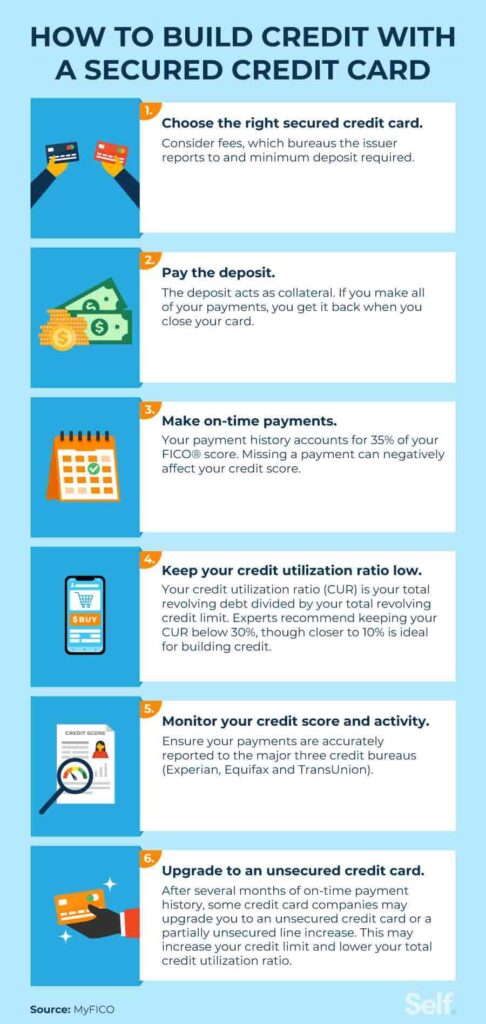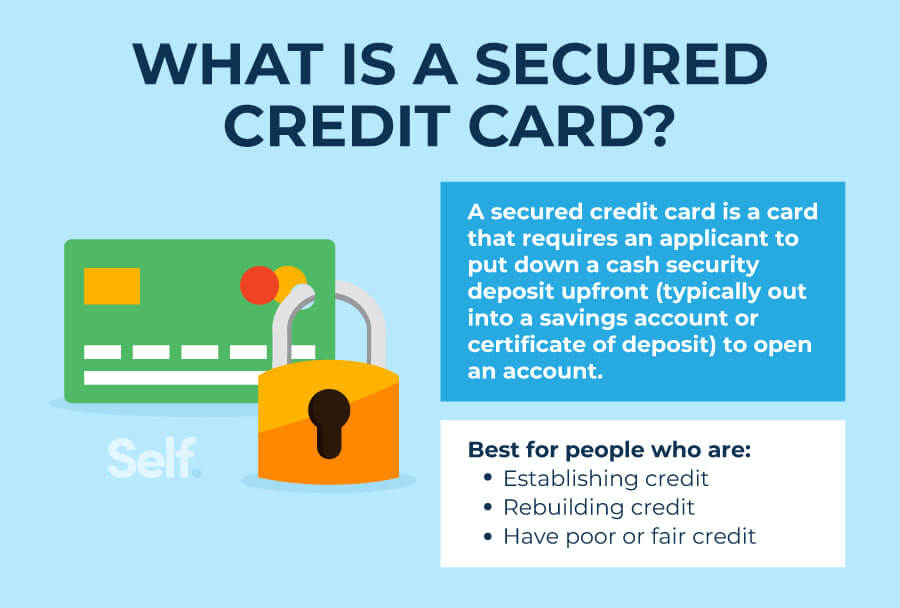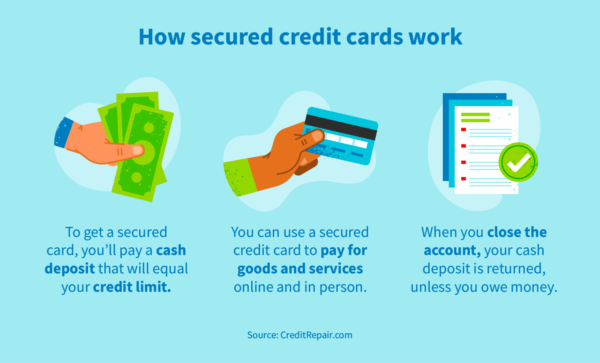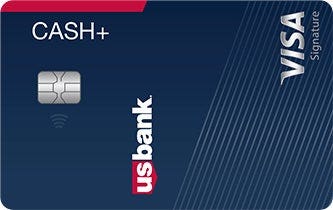In this article, you will learn about how using secured credit cards can help you rebuild your credit. Secured credit cards are a great option for those who have poor credit or are looking to establish credit for the first time. They require a security deposit, which acts as collateral and helps minimize risk for the credit card issuer. By responsibly using a secured credit card, you can gradually improve your credit score and demonstrate to lenders that you are a trustworthy borrower.
When using a secured credit card, it’s important to start with a small credit limit and make regular, on-time payments. This shows responsible credit management and builds a positive payment history. Over time, you may be able to increase your credit limit and eventually transition to an unsecured credit card. It’s crucial to be patient and consistent in your credit rebuilding efforts, as it can take some time to see significant improvements. By understanding how secured credit cards work and using them wisely, you can take positive steps towards rebuilding your credit and improving your overall financial health.
Introduction
What are secured credit cards?
Secured credit cards are a type of credit card that requires a security deposit to be placed by the cardholder. This security deposit acts as collateral and reduces the risk to the credit card issuer. Secured credit cards are often used by individuals who have poor credit or no credit history and are looking to rebuild their credit.
Why are they used for credit rebuilding?
Secured credit cards are particularly helpful for individuals who are looking to rebuild their credit. They offer an opportunity to demonstrate responsible credit behavior and establish a positive credit history. By using and managing a secured credit card responsibly, individuals can improve their credit scores over time and eventually qualify for unsecured credit cards with more favorable terms and conditions.
Understanding Secured Credit Cards
Definition of secured credit cards
Secured credit cards are a type of credit card that requires the cardholder to provide a security deposit as collateral. The credit limit on a secured credit card is typically equal to or a percentage of the security deposit. The security deposit is held by the issuer and can be used to cover any outstanding balances if the cardholder fails to make payments.
How do secured credit cards work?
When you apply for a secured credit card, you will need to provide a security deposit, usually ranging from $200 to $2,500, depending on the issuer’s requirements. This security deposit acts as collateral and determines the credit limit you will be assigned. As you use the secured credit card for purchases, the issuer reports your payment history to the credit bureaus, helping to establish or rebuild your credit history. It’s important to note that secured credit cards function similarly to traditional unsecured credit cards and can be used for online purchases, in-store purchases, and cash withdrawals.
Benefits of using secured credit cards
Using a secured credit card offers several benefits for individuals looking to rebuild their credit. Some of the main advantages include:
-
Credit building: Secured credit cards provide an opportunity to establish or rebuild a positive credit history. By making timely payments and using the card responsibly, you can improve your credit score over time.
-
Availability to those with poor or no credit: Secured credit cards are generally available to individuals with poor credit scores or no credit history. They provide a pathway for these individuals to access credit and improve their financial standing.
-
Flexibility: Secured credit cards can be used in the same way as traditional unsecured credit cards. They can be used for everyday purchases, online shopping, and even cash withdrawals.
-
Upgrade and transition options: Many secured credit card issuers offer upgrade options after a certain period of responsible card usage. This allows cardholders to transition to unsecured credit cards, which often come with more favorable terms and conditions.

This image is property of images.ctfassets.net.
Rebuilding Your Credit with Secured Credit Cards
Evaluate your credit situation
Before diving into the world of secured credit cards, it’s important to evaluate your credit situation. Take a look at your credit reports from all three major credit bureaus: Experian, Equifax, and TransUnion. Look for any errors, inaccuracies, or negative items that may be impacting your credit score.
Research and compare secured credit card options
When it comes to choosing a secured credit card, it’s essential to do your research and compare the options available to you. Look for cards with low fees, reasonable interest rates, and positive reviews from cardholders. Consider factors such as the credit limits offered, the amount of the required security deposit, and any additional benefits or rewards offered by the card.
Choose the right secured credit card for your needs
Once you have done your research, it’s time to choose the right secured credit card for your needs. Consider factors such as the required security deposit, the credit limit offered, the fees associated with the card, and any additional benefits that may be important to you. It’s also worth considering the reputation of the issuer and their track record for customer service.
Apply for a secured credit card
Once you have chosen the right secured credit card for your needs, it’s time to apply. The application process is similar to that of a traditional credit card but may require additional documentation, such as proof of income or identification. Be prepared to provide the required security deposit upfront.
Use the secured credit card responsibly
Once you are approved for a secured credit card, it’s important to use it responsibly. This means making timely payments, staying within your credit limit, and avoiding unnecessary credit card debt. Responsible use of your secured credit card will help to build a positive credit history and improve your credit score over time.
Make timely payments
One of the most important factors in rebuilding your credit with a secured credit card is making timely payments. Pay your monthly bill in full and on time to avoid any late payment fees and negative impacts on your credit score. Consider setting up automatic payments to ensure that you never miss a due date.
Keep utilization low
Another important factor to consider is keeping your credit utilization low. Credit utilization is the amount of credit you are using compared to your available credit limit. Aim to keep your credit utilization below 30% to demonstrate responsible credit usage and avoid appearing financially overextended to potential lenders.
Monitor your credit progress
As you use your secured credit card and make payments on time, it’s important to regularly monitor your credit progress. Keep an eye on your credit reports and credit scores to track any improvements. Monitoring your credit will also allow you to identify and address any errors or inaccuracies that may be negatively impacting your credit score.
Factors to Consider Before Getting a Secured Credit Card
Credit limits and security deposits
When considering a secured credit card, it’s important to take into account the credit limits offered and the required security deposit. The credit limit should be sufficient for your needs, while the security deposit should be manageable for your budget.
Interest rates and fees
Different secured credit cards may come with different interest rates and fees. Be sure to review and compare these costs before making a decision. Look for cards with reasonable interest rates and low fees to minimize the overall cost of using the card.
Reporting to credit bureaus
Not all secured credit cards report to all three major credit bureaus. Look for a card that reports your payment history to all three bureaus to ensure that your efforts in building credit are recognized by a wide range of lenders.
Reputation of the issuer
Before choosing a secured credit card, take the time to research the reputation of the issuer. Look for established financial institutions with a track record of providing excellent customer service and fair terms and conditions.
Upgrade and transition options
Consider whether the secured credit card issuer offers upgrade and transition options. After a certain period of responsible use, some issuers allow cardholders to transition to unsecured credit cards. This can be a significant step in your credit rebuilding journey.

This image is property of images.ctfassets.net.
Tips for Maximizing the Benefits of Secured Credit Cards
Set a budget and stick to it
To maximize the benefits of a secured credit card, it’s important to set a budget and stick to it. Determine how much you can afford to spend each month and make sure to stay within that budget. Avoid the temptation to overspend and rack up unnecessary debt.
Pay in full and on time
Paying your secured credit card bill in full and on time is crucial to building good credit. Make it a priority to pay off your balance in full each month and never miss a due date. This will help you establish a track record of responsible credit behavior and improve your credit score over time.
Avoid unnecessary credit card debt
While it can be tempting to use your secured credit card for luxury purchases, it’s important to avoid unnecessary credit card debt. Only use your card for purchases that you can afford to pay off in full each month. This will help you avoid accumulating debt and potentially falling into financial trouble.
Keep utilization below 30%
As mentioned earlier, keeping your credit utilization below 30% is important for demonstrating responsible credit usage. Aim to keep your balances well below your credit limit to show potential lenders that you can manage credit responsibly.
Regularly review your credit reports
Regularly reviewing your credit reports is a good habit to develop when rebuilding your credit. This will allow you to identify any errors or inaccuracies that may be impacting your credit score. If you notice any mistakes, be sure to dispute them with the credit bureaus to have them corrected.
Common Mistakes to Avoid with Secured Credit Cards
Closing the account too soon
One common mistake that individuals make with secured credit cards is closing the account too soon. Closing the account too soon can impact your credit score negatively, as it reduces the length of your credit history. Instead, consider keeping the account open even after you’ve transitioned to an unsecured credit card to maintain a longer credit history.
Using the card for luxury purchases
Using your secured credit card for luxury purchases is another mistake to avoid. Remember that the purpose of the card is to rebuild your credit, not to fund unnecessary expenses. Stick to using the card for essential purchases and pay off the balance in full each month.
Making only minimum payments
Making only the minimum payment on your secured credit card each month is a mistake that should be avoided. Minimum payments may keep your account in good standing, but they won’t help you make significant progress in rebuilding your credit. Aim to pay off your balance in full each month to demonstrate responsible credit behavior.
Neglecting to read the terms and conditions
Before signing up for a secured credit card, it’s important to read and understand the terms and conditions. Neglecting to do so can result in surprise fees or penalties that could impact your credit rebuilding efforts. Take the time to familiarize yourself with the terms and conditions and ask any questions you may have before opening an account.

This image is property of www.creditrepair.com.
Monitoring Your Credit Progress
Tracking credit score improvements
Tracking your credit score improvements is an important part of the credit rebuilding process. There are several ways to access your credit score, including through credit monitoring services or by using free resources such as Credit Karma or Experian Boost. Keep an eye on your credit score regularly to see the progress you are making.
Reviewing credit reports
In addition to monitoring your credit score, it’s also important to review your credit reports. You are entitled to one free credit report from each of the three major credit bureaus once a year. Take advantage of this opportunity to review your reports for any errors or inaccuracies that may be negatively impacting your credit score.
Disputing errors or inaccuracies
If you identify any errors or inaccuracies on your credit reports, it’s important to take action. Dispute these items with the credit bureaus to have them corrected. This can help improve your credit score and ensure that your credit history is accurately represented to potential lenders.
Transitioning to Unsecured Credit Cards
Building credit history with a secured credit card
Using a secured credit card responsibly is an effective way to build a positive credit history. By making timely payments and keeping your credit utilization low, you can demonstrate to potential lenders that you are a responsible borrower. This credit history will be crucial when it comes to transitioning to unsecured credit cards.
Qualifying for an unsecured credit card
To qualify for an unsecured credit card, you will generally need to have a positive credit history with your secured credit card. Lenders will review your credit reports and credit scores to assess your creditworthiness. If you have demonstrated responsible credit behavior with your secured credit card, you are more likely to qualify for an unsecured credit card.
Closing the secured credit card account
Once you have successfully transitioned to an unsecured credit card, you may be tempted to close your secured credit card account. However, it’s generally recommended to keep the account open, especially if it has no annual fee. Closing the account could negatively impact your credit score by reducing the length of your credit history. Instead, consider keeping the account open and using the card occasionally to maintain an active credit history.

This image is property of i.ytimg.com.
Additional Strategies for Credit Rebuilding
Diversify your credit mix
In addition to using a secured credit card, diversifying your credit mix can also be beneficial for credit rebuilding. Consider adding other types of credit, such as an installment loan or a credit builder loan, to your credit portfolio. This can demonstrate to lenders that you can responsibly manage different types of credit.
Consider credit builder loans
Credit builder loans can be a useful tool for credit rebuilding. These loans are specifically designed to help individuals build or rebuild credit. They typically involve borrowing a small amount of money and making regular payments over a set period. The loan payments are reported to the credit bureaus, helping to establish or improve your credit history.
Become an authorized user
Another strategy for credit rebuilding is to become an authorized user on someone else’s credit card. This allows you to benefit from their positive credit history and can help boost your credit score. However, it’s important to choose someone who has a good credit history and makes timely payments. Additionally, ensure that the credit card issuer reports authorized user activity to the credit bureaus.
Conclusion
Using secured credit cards to rebuild your credit can be a powerful tool for improving your financial standing. By utilizing secured credit cards responsibly, individuals with poor credit or no credit history can establish or rebuild their credit, leading to improved credit scores and increased access to credit in the future. Remember to evaluate your credit situation, research and compare secured credit card options, and choose the right card for your needs. Use the card responsibly, make timely payments, and keep your credit utilization low. Monitor your credit progress, dispute any errors or inaccuracies, and consider transitioning to unsecured credit cards when the time is right. By taking these steps and implementing additional credit rebuilding strategies, you can set yourself on the path to a brighter financial future.

This image is property of thumbor.forbes.com.
